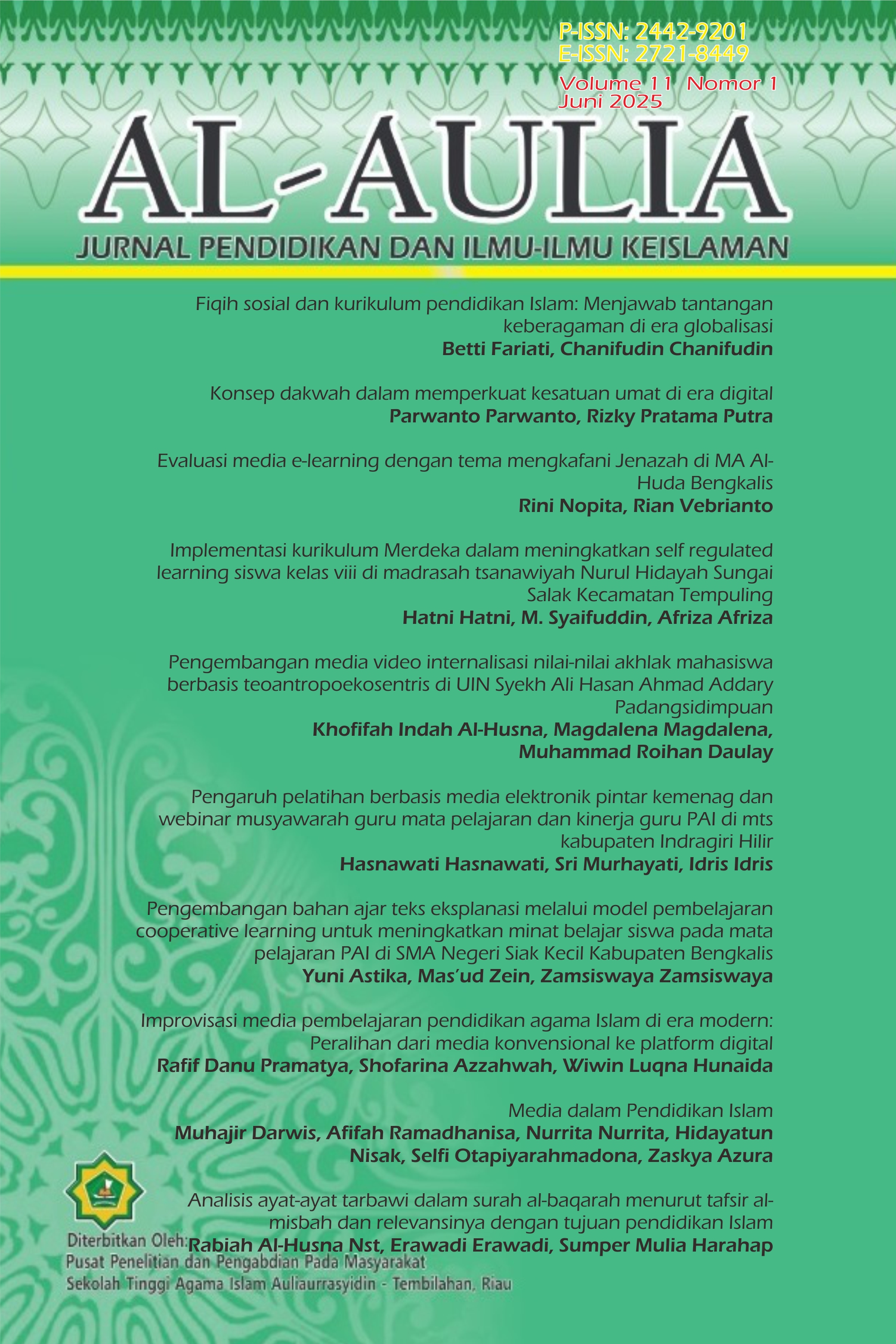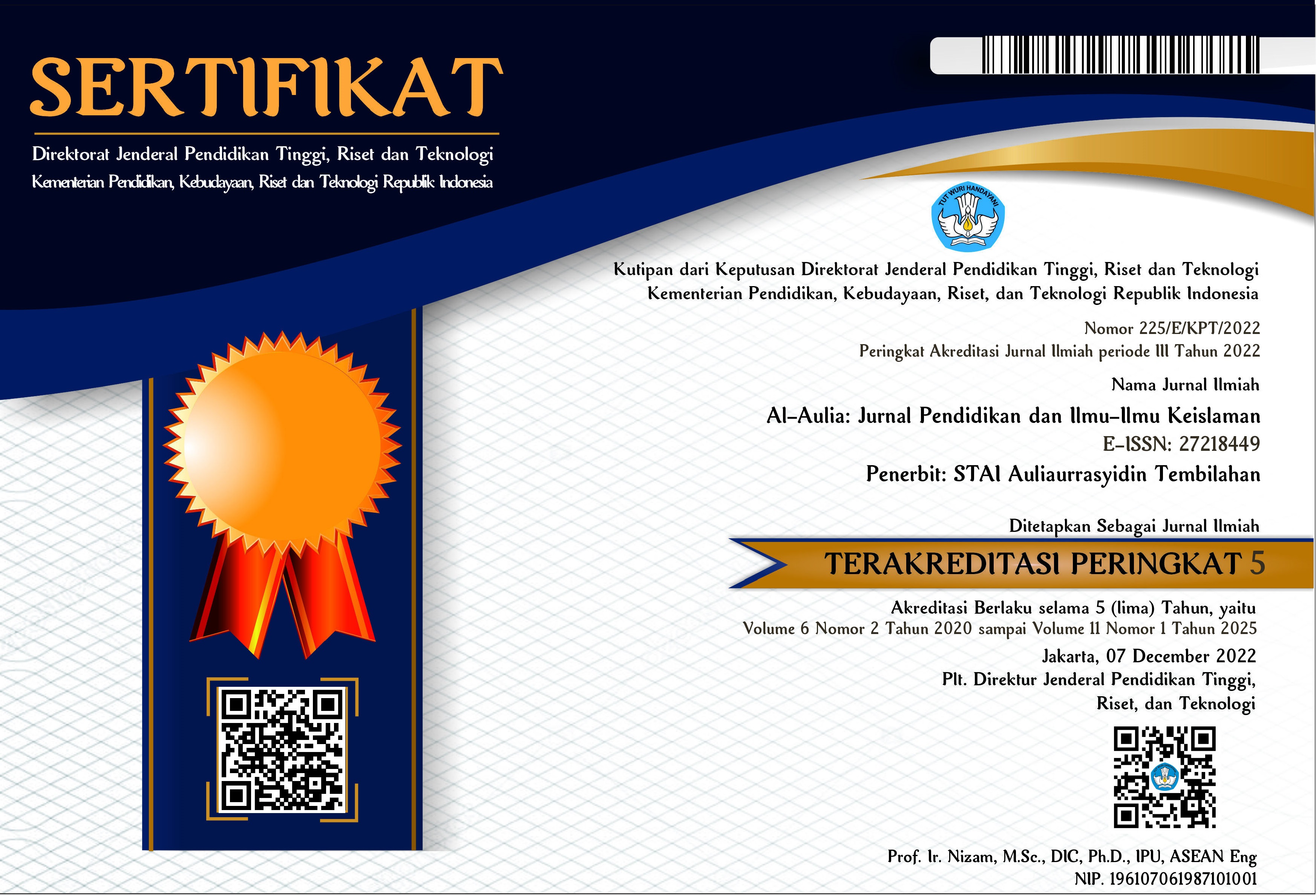Pengembangan media video internalisasi nilai-nilai akhlak mahasiswa berbasis teoantropoekosentris di UIN Syekh Ali Hasan Ahmad Addary Padangsidimpuan
DOI:
https://doi.org/10.46963/aulia.v11i1.2749Keywords:
Internalization, Moral Values, TeoantropoekosentrisAbstract
This study aims to develop a video media for internalizing students' moral values based on theoanthropopoecocentric at UIN Syekh Ali Hasan Ahmad Addary Padangsidimpuan, using the ADDIE research model (Analysis, Design, Development, Implementation, Evaluation). The results show that the analysis of student needs really likes videos in the form of live dialogues, videos taken around the dormitory, using Indonesian, duration less than 10-15 minutes, using additional text and musical accompaniment. The scene contains morals of mutual respect, responsibility and fairness with an introduction to the campus at the beginning of the video. The design of the video media starts from determining the flow, preparing the material in the video, then continuing with development based on the assessment of media and material experts. The results of the implementation and evaluation of the video media are that students can easily understand the video and its objectives and are very inspired and touched so that they feel interested in internalizing the concept of theoanthropopoecocentric, providing a deeper understanding of living life and students realize the importance of morals that are not only oriented towards themselves.
References
Achmadi. (2008). Ideologi Pendidikan Islam Paradigma Humanisme Teosentris. Yogyakarta: Pustaka Pelajar.
Anhar. (2020, October 24). Teoantropoekosentris: Integrasi Ayat Qauliyah, Insaniyah Dan Kauniyah. Retrieved May 7, 2025, from https://anhar.dosen.uinsyahada.ac.id/2020/10/teoantropoekosentris-integrasi-ayat.html
Anhar. (2024). Paradigma integrasi ilmiah teoantropoekosentris: Esai interpretatif tentang paradigma ilmiah teoantropoekosentris UIN Syekh Ali Hasan Ahmad Addary Padangsidimpuan. Malang: Madza Media.
Anugrah, A. T., Latipah, E., & Izzah, I. (2022). Pembentukan Akhlak Mahasiswa melalui Psikologi Islami. Tarbiyatuna: Jurnal Pendidikan Islam, 15(2), 135–148.
Anugrah Arifin. (2020). Aqidah Akhlak (Berbasis Humanistik). Klaten: Penerbit Lakeisha.
Dede Setiawan, M. Alwi AF, Fahmi Muhamad Aziz, Abdul Fajar, & Yurna. (2023). Pandangan Filsafat Pendidikan Islam Terhadap Manusia Dan Masyarakat. Jurnal Pendidikan Berkarakter, 1(4), 52–63.
Fitria Hidayat. (2021). Model ADDIE (Analysis, Design, Development, Implementation And Evaluation) Dalam Pembelajaran Pendidikan Agama Islam. Jurnal Inovasi Pendidikan Agama Islam, 1(1), 28–37.
Ibrahim Siregar. (2021). Integrasi Keilmuan [ada Perguruan Tinggi Keagamaan Islam (PTKI) dan Aktualisasi Islam Inklusif. In: Reposisi, Redefenisi dan Reaktualisasi Model Baru Integrasi Keilmuan dalam Membangun Kedewasaan Beragama. Yogyakarta: LKiS.
Kementerian Agama RI,. (2007). Al-Qur’an dan Terjemah. Bandung: PT Sygma Examedia Arkanleema.
M. Quraish Shihab. (2011). Tafsir Al-Misbah Pesan, Kesan dan Keserasian A-Qur’an. Jakarta: Lentera Hati.
Marzuki^1, M., Abd Rahman, M. H., Kaspin, K. G., Basri, M., Jamal, N. M. M. N., & Othman, I. W. (2021). Universiti Sebagai Medan Pembentukan Kecemerlangan Akhlak Mahasiswa. Retrieved from https://www.academia.edu/download/106018318/IJEPC-2021-39-05-05.pdf
Sugiyono. (2016). Metode Penelitian Kuantitatif, Kualitatif, R&D. Bandung: IKAPI.
Suharsimi Arikunto. (2020). Prosedur Penelitian Suatu Pendekatan Praktik. Jakarta: Rineka Cipta.
Taufik Rusmayana. (2021). Model Pembelajaran ADDIE Integrasi Pedati Di SMK PGRI Karisma Bangsa Sebagai Pengganti Praktek Kerja Lapangan Dimasa Pandemi Covid-19. Bandung: Widiana Bakti Persada.
UPT. Mahad Jamiah UIN Syekh Ali Hasan Ahmad Addary Padangsidimpuan. (2024). Tentang Mahad Sekilas Tentang UPT. Mahad Jamiah. Retrieved from https://mahad.uinsyahada.ac.id/
Downloads
Published
Issue
Section
License
Copyright (c) 2025 Khofifah Indah Al-Husna, Magdalena Magdalena, Muhammad Roihan Daulay

This work is licensed under a Creative Commons Attribution-ShareAlike 4.0 International License.
Authors who publish with this journal agree to the following terms:
1. Copyright on any article is retained by the author(s).
2. The author grants the journal, right of first publication with the work simultaneously licensed under a Creative Commons Attribution License that allows others to share the work with an acknowledgment of the work’s authorship and initial publication in this journal.
3. Authors are able to enter into separate, additional contractual arrangements for the non-exclusive distribution of the journal’s published version of the work (e.g., post it to an institutional repository or publish it in a book), with an acknowledgment of its initial publication in this journal.
4. Authors are permitted and encouraged to post their work online (e.g., in institutional repositories or on their website) prior to and during the submission process, as it can lead to productive exchanges, as well as earlier and greater citation of published work.
5. The article and any associated published material is distributed under the Creative Commons Attribution-ShareAlike 4.0 International License







